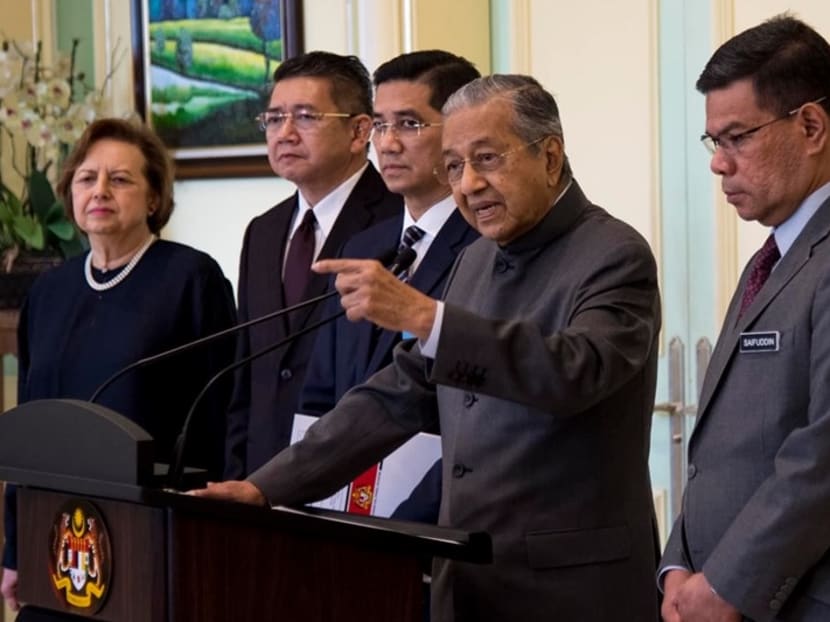Making sense of Mahathir’s controversial appointment of new anti-graft chief
Malaysia’s Prime Minister Mahathir Mohamad received much flak recently over his unilateral decision to appoint a new commissioner of the Malaysian Anti-Corruption Commission (MACC) without going through the Cabinet. What can we make of the episode given the current dynamics in Malaysian politics?

Questions on when Dr Mahathir (pictured) will hand over to his successor Anwar Ibrahim will not go away and the MACC appointment saga will only add to further speculation, says the author.
Malaysia’s Prime Minister Mahathir Mohamad received much flak recently over his unilateral decision to appoint a new commissioner of the Malaysian Anti-Corruption Commission (MACC) without going through the Cabinet.
His choice of Ms Latheefa Koya, a lawyer and human rights activist from Parti Keadilan Rakyat (PKR), also went against the ruling Pakatan Harapan coalition’s election promise that politicians would not hold positions in independent agencies such as MACC.
Civil society activists, opposition politicians and even some within PH have questioned the move. But Dr Mahathir has stood firm, saying that it was within his power to appoint Ms Latheefa and his decision was final.
What can we make of the episode given the current dynamics in Malaysian politics?
First, the appointment of Ms Latheefa came as a complete surprise, even to senior members of PH.
Her predecessor, Mohd Shukri Abdull, was a three-decade MACC veteran. He had resigned after serving for a year, saying that his job was done after completing a probe on wrongdoing at state investment firm 1Malaysia Development Berhad.
Dr Mahathir said that she picked Ms Latheefa as she has a strong character, an important trait for the job.
But by bypassing the Cabinet, he had gone against the norms of parliamentary democracy, where the Cabinet exercises collective responsibility and speaks with one unanimous voice.
One is reminded of Dr Mahathir’s first stint as prime minister, between 1981 and 2003. His opponents called him semi-authoritarian, if not a “dictator”.
When he came back to power last year, many believed he had re-branded himself to be more consultative. Moreover, according to PH’s manifesto, the parliament’s powers should be strengthened to prevent the executive or prime minister from becoming too powerful.
Seen in this context, Ms Latheefa’s appointment should have gone through a parliamentary select committee, notwithstanding Dr Mahathir’s point that the constitution must be tweaked to empower such a committee and PH cannot do so as it lacks the two-thirds parliamentary majority to carry out constitutional changes.
The episode has once again exposed cracks within the one-year old PH government. Ideologically, it is already loosely knit, but having ministers coming out saying they did not know of their boss’ decision further shows lack of discipline in the Cabinet.
Conspiracy theorists were quick to suggest that Dr Mahathir’s move was directed at Prime Minister in waiting Anwar Ibrahim, even going as far as to say that this could be another sign that the 93-year-old prime minister may not be handing over so soon to his successor.
Mr Anwar’s first response was to call on Dr Mahathir to explain why he did not consult the Cabinet and went against PH’s election manifesto, but he has since said he supported the prime minister’s move and Ms Latheefa should be allowed to do her job.
It is useful to note that while Ms Latheefa was once Mr Anwar’s lawyer, she has since accused him of cronyism. She is also closer to Mr Anwar’s rival camp in PKR led by Economic Affairs Minister Azmin Ali, who has also been talked about as a potential prime ministerial candidate.
Asked by the media if there was any truth to the speculation, Dr Mahathir said that he picked her simply because she is qualified for the job and it had nothing to do with Mr Anwar.
But questions on when he will hand over to Mr Anwar will not go away and the MACC appointment saga will only add to the speculation.
The handover was an election promise by Dr Mahathir that has kept the PH coalition intact. The general view is that leadership transition will be done within two years after the 2018 election.
Now, it could be beyond that. Already, Dr Mahathir, through his party Bersatu, has made many strategic calculations to neutralise Mr Anwar’s power base.
Bersatu accepted some senior United Malays National Organisation members and former ministers into its fold to increase its seats in parliament. Bersatu has also set up branches in Sabah, an important state that could deliver seats into parliament.
Dr Mahathir also did not campaign in the last by-election in Rantau, a state seat in Negeri Sembilan in close proximity to Mr Anwar’s Port Dickson parliament seat.
PH lost in the contest, and the defeat was a blow to Mr Anwar as it signaled that Malaysia’s future prime minister could not rally voters in his home state.
Dr Mahathir’s calculations in picking Ms Latheefa, who resigned from PKR after taking the MACC role, may never be known.
It could well be that he wanted to be seen choosing someone not considered to be from within his inner circle.
Dr Mahathir may still emerge stronger from this episode if Ms Latheefa can make bold moves to tackle corruption.
To do so, she will have to be above politics, and even hunt corrupters within her former party, if any.
This will not be easy.
Already, she has to recuse herself from an MACC probe on allegations by a United Malays National Organisation member that RM 3 million was transferred into a bank account bearing a PKR minister’s name in 2017.
Time will tell if Dr Mahathir made the correct judgement or if there is more to the appointment than meets the eye.
ABOUT THE AUTHOR:
Norshahril Saat is Fellow at Iseas-Yusof Ishak Institute. He is the author of The State, Ulama and Islam in Malaysia and Indonesia.






